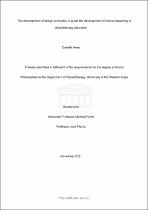| dc.contributor.advisor | Rowe, Michael | |
| dc.contributor.author | Hess, Danelle | |
| dc.date.accessioned | 2022-03-30T08:09:03Z | |
| dc.date.available | 2022-03-30T08:09:03Z | |
| dc.date.issued | 2021 | |
| dc.identifier.uri | http://hdl.handle.net/11394/8987 | |
| dc.description | Philosophiae Doctor - PhD | en_US |
| dc.description.abstract | Clinical reasoning is enigmatic; however, students need to learn how to do it, educators need to be able to develop it, and experts need to explain how they do it. Health professions educators have described clinical reasoning as a skill required for health professionals. Clinical reasoning has been used synonymously with terms such as clinical judgement, critical thinking and clinical decision-making. Broadly speaking, clinical reasoning refers to the thought and decision-making processes associated with clinical practice and particularly choosing a course of action for a patient. Possible strategies for developing clinical reasoning and the use of certain learning tasks in the development of clinical reasoning in undergraduate health professions students have been highlighted. However, there are still areas of research to consider. | en_US |
| dc.language.iso | en | en_US |
| dc.publisher | University of the Western Cape | en_US |
| dc.subject | Clinical reasoning | en_US |
| dc.subject | Undergraduate students | en_US |
| dc.subject | Curriculum | en_US |
| dc.subject | Higher education | en_US |
| dc.subject | Physiotherapy | en_US |
| dc.title | The development of design principles to guide the development of clinical reasoning in physiotherapy education | en_US |
| dc.rights.holder | University of the Western Cape | en_US |

